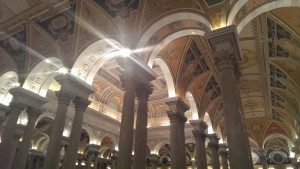I’ve been in Washington D.C. the last several days as my wife attends a conference. I’ve had the chance to do some sightseeing while she was in sessions, and seen some interesting things. But the best thing so far was when we attended a reception at the Library of Congress’s Thomas Jefferson building last night.
 They opened up the main hall, a couple of side display wings, and the main reading room for us to look around in. The building was like a secular temple, everywhere you looked there were details, and carvings and artwork. The great scientific, artistic and philosophical minds of the past were venerated like saints with statues, paintings, and sometimes just their names in places of honor. I don’t know how crowded the building is during normal tourist hours, but I’m fairly certain that to see it with the relatively small number of people present last night was a rare privilege. The most striking part for me though was the main reading room.
They opened up the main hall, a couple of side display wings, and the main reading room for us to look around in. The building was like a secular temple, everywhere you looked there were details, and carvings and artwork. The great scientific, artistic and philosophical minds of the past were venerated like saints with statues, paintings, and sometimes just their names in places of honor. I don’t know how crowded the building is during normal tourist hours, but I’m fairly certain that to see it with the relatively small number of people present last night was a rare privilege. The most striking part for me though was the main reading room.
 The main reading room was like a cathedral to knowledge, wisdom, and artistry; it struck me as a sacred place as soon as we entered. This, I image, was a once in a lifetime kind of experience. I sat down in one of the chairs and just observed the details and pondered on the numinous feelings I was having. I think I sat there for around forty five minutes to an hour, relatively alone, there probably wasn’t another person within ten feet or so. Again, it was like a religious experience, absolutely amazing.
The main reading room was like a cathedral to knowledge, wisdom, and artistry; it struck me as a sacred place as soon as we entered. This, I image, was a once in a lifetime kind of experience. I sat down in one of the chairs and just observed the details and pondered on the numinous feelings I was having. I think I sat there for around forty five minutes to an hour, relatively alone, there probably wasn’t another person within ten feet or so. Again, it was like a religious experience, absolutely amazing.
I pondered on what it was about the building that made it so striking, and sacred to me. I believe it was that the building was built to honor and venerate all forms of intellectual accomplishment, and in doing so it becomes itself a great artistic accomplishment. I have a lot of respect for the artistic and intellectual minds of the past, and so being in that building felt like I held a connection to all of those great minds throughout history.
It all reminded me of an article I read years ago, I don’t recall where it was, but I think it may have been an article in The Escapist back when it was just an online magazine. The article talked about the pulp writers of the past, like H.P. Lovecraft, or Robert E. Howard. Specifically it talked about how those writers wrote about barbarians fighting wizards, or unthinkable monsters devouring hapless investigators, subjects that aren’t typically associated with great literature. And yet despite their apparently low-brow subject matter, they still used their work to express their views and feelings towards life. In reading Lovecraft you can get a feel for how he probably saw the world, an incomprehensibly large and meaningless place where humans are nothing but pathetic insects. A place where heroes, those who reach too far, or dig too deep, inevitably end up taken by madness or devoured by unthinkable monstrosities. Eventually, you gain an understanding of the author, what they valued, what they feared, and how they felt that life rewarded those who reached for the sky.
That’s important I think. I often feel that the importance in art is to form a connection between the artist and the viewer. It’s a way to reach out into the uncaring world, and to say “Here I am. I exist. I matter.”, and someone else can pick up your work and feel a connection to you, and for a moment you aren’t alone. Lovecraft’s work resonated with me, I loved the subjects of his stories: slumbering monsters, dusty tomes that induce madness in the reader, and long lost secrets that are better off remaining hidden. But at the same time his themes of existential horror, solitude in an enormous uncaring universe, and the endless futility of life resonated with me as well. That sounds fairly emo, but I wasn’t terribly happy through most of my twenties, alright? But that gets at what I found so profound about the Library of Congress, it seemed a celebration of all creators, those venerated through the ages, and those that are venerated by only a few. There was a display case with several batman comic books on display, it was awesome.
Now, to tie it back to video games. Perhaps we haven’t, as an art form, reached the artistic heights of Shakespeare, Van Gogh, or DaVinci; but I think we have reached the artistic level of H.P. Lovecraft, Robert E. Howard, and Keith Laumer. We have games that entertain and resonate on a mechanical and narrative level; but many, especially those made by small teams, also resonate on a thematic level. By playing the game you can get a feel for what the creators value and how they view life. And that, I think, is something worth celebrating, and truly validates the medium as an art form.
Sitting in the reading room last night left me with a determination to join the ranks of authors that I have read and loved. I want my games to not only entertain, but also to express, somehow, what it is that I value in life. And if my work resonates deeply with even one person out there, then I would consider it a triumph.
